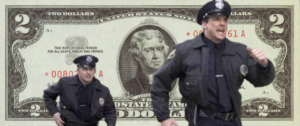2013 Forgery Case Back in the Spotlight
 During the 2013-2014 school year in Texas’s Fort Bend Independent School District, there were eight investigations of counterfeit money conducted by the police department. Perhaps the most notable occurred at Christa McAuliffe Middle School, where 13-year-old Danesiah Neal paid for her chicken tenders with a two-dollar her grandmother gave her. Instead of getting lunch, however, she got threatened with a third-degree felony.
During the 2013-2014 school year in Texas’s Fort Bend Independent School District, there were eight investigations of counterfeit money conducted by the police department. Perhaps the most notable occurred at Christa McAuliffe Middle School, where 13-year-old Danesiah Neal paid for her chicken tenders with a two-dollar her grandmother gave her. Instead of getting lunch, however, she got threatened with a third-degree felony.
In an interview with Ted Oberg Investigates, Neal described the incident quite concisely:
“I went to the lunch line and they said my two-dollar bill was fake. They gave it to the police. Then they sent me to the police office. A police officer said I could be in big trouble.”
And she could’ve been, if the dollar was fake. But it wasn’t.
Everything is bigger in Texas…
…including, apparently, wild goose chase investigations of middle schoolers.
After telling Danesiah Neal how badly she fucked up, police officers called her grandmother, Sharon Kay Joseph. Joseph was concerned — not because she believed her granddaughter had blown the cover off the family’s counterfeit money business, but because she was the kind of student who was “never in trouble.”
The cops told Granny Joseph that the two-dollar bill was fake, because why not presume guilt over innocence in a serious case like this? She expressed surprise (and probably doubt) and directed police officers to the convenience store that gave her the allegedly fake money. This was evidently not helpful, so the police decided to check with the money experts at a local bank. What they discovered was shocking (to the cops): they were wrong. The bill wasn’t fake, it was too old for a counterfeit pen to work on it.
Granny Joseph got her two-dollar bill back without no apologies, not from the police officer who returned it or the school. This didn’t sit well with Joseph:
“He didn’t apologize. He should have and the school should have because they pulled Danesiah out of lunch and she didn’t eat lunch that day because they took her money.”
Crimes of Forgery:
In the state of Texas, forgery is a third-degree felony. Even minors aren’t exempt from the consequences of a crime like this — which means Danesiah Joseph could’ve been looking at ten years in prison if the cops had gone with their inaccurate instincts. In Tennessee, forgery is a Class E felony.
An interesting note: Ted Oberg Investigates conducted a Ted Oberg Investigation on “lunch line forgeries” between the 2013-2014 school year and 2016. Of the forty cases on record, just one involved a white person accused of forgery, and he wasn’t even a student. He was 27 years old.
When Ted Oberg Investigates asked the investigated districts for a response to their findings, the answer was a unanimous no.
At Turner Law Offices, P.C., our team of attorneys has years of experience working with clients across a wide range of case involving forgery crimes. If your child has been accused of lunch line forgery, or you’ve been accused of forgery yourself, it’s crucial that you take legal action as soon as possible — especially if there seems to be evidence of racial bias. Call today, or go online to set up your free initial consultation, and meet with a skilled lawyer who’s ready and waiting to guide you toward the justice you deserve.







